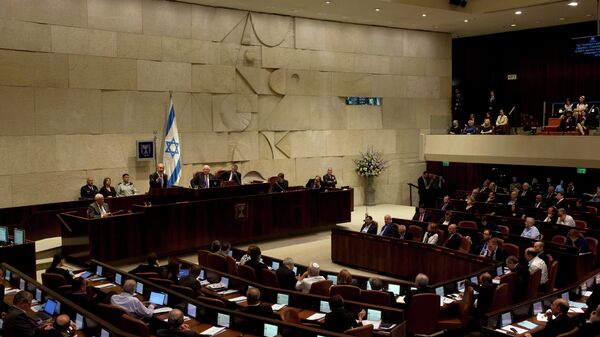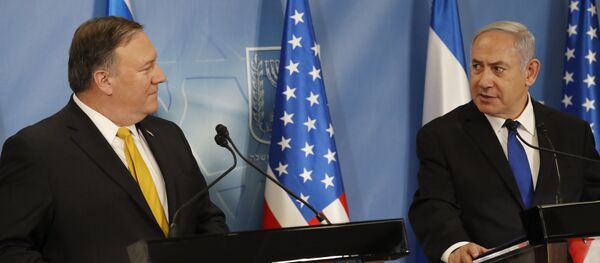Netanyahu responded to the claim by saying that Bennet is "stressed and a bit confused", adding that small parties do all sorts of strange things during the election, including things that are unfounded. Earlier, Trump's son-in-law, senior White House adviser Jared Kushner relayed that the peace plan would not be published until after the election.
Sputnik discussed the issue with Dan Avnon, Chair of the Department of Political Science at the Hebrew University of Jerusalem.
Sputnik: There have been many diplomatic efforts to realise the two-state solution, starting from the 1991 Madrid Conference, but no progress has been made. Who's to blame for that?
Dan Avnon: It seems that the blame is split on both sides; there isn't an objective opinion on that. It is clear that at this stage of the negotiations the Israeli perspective is that the Palestinians are too split and divided among themselves in a manner that does not enable negotiating with a reliable counterpart. This has been Prime Minister Netanyahu's claim over the past few years, for sure, the past four years where he has led a right-wing coalition government.
READ MORE: Israel Rejects UN Report on Actions of Its Soldiers Against Palestinians — FM
This is where your opening statement comes into play because the Minister of Education has established a party called the New Right and they think that a two-state solution is not tenable. From the larger perspective, the Palestinians find it difficult to conclude a negotiation in the short term right now during the Israeli elections; the right-of-centre political parties will attack Netanyahu, saying that he is giving in to the Palestinians and to American pressure and will establish the Palestinian state and that it will be terrible. But I think that this is campaign rhetoric; the big picture is how to create conditions to establish a Palestinian state while maintaining Israel's security. That, I think, is what we will see after the elections.
Sputnik: What do you think of the timing of this announcement?
Dan Avnon: It's really interesting. One never knows what purpose the timing serves. In terms of the Israeli domestic scene, this is a very strong reminder that in the 40 days until our election, the issue of Israel's future as a sovereign state — sovereign meaning having fixed boundaries with the Palestinian state on the other side of our boundary — is something that has to be taken into account.
Sputnik: Do you think the Palestinians will accept this sort of proposal?
Dan Avnon: I'm not an expert on Palestinian society; it's difficult to be an expert on Palestinian politics. I can just say, not as an expert, that the perception in Israel is that the Palestinians, especially the West Bank Palestinian authority, have not managed to create a kind of authority that enables them to negotiate in true faith.
READ MORE: Israel Chokes Off Water Supply to 17 Palestinian Communities — Report
We must remember that there is the Hamas leadership in Gaza, Hamas in the Palestinian Authority who don't get along together at all; and so we have actually two different Palestinian entities, two different leaderships. Just from that perspective, it is difficult to imagine with whom this peace plan will be negotiated. Formally, it's the Palestinian Authority that is located in the West Bank, but it's difficult to predict a positive outcome in terms of the Palestinian ability to come together to the table.
Sputnik: What impact could the supposed plan have on Mr. Netanyahu's reputation and on the April elections?
Dan Avnon: Prime Minister Netanyahu will have 40-something days of manoeuvring between conflicting positions that he himself put forth. He is the Prime Minister who said that there will be a two-state solution, and he is the Prime Minister who says that there's no one to talk to about the two-state solution. He is the Prime Minister who advocates [Israel returning to] its biblical boundaries, and he is the Prime Minister who is a pragmatic statesman who can also negotiate some kind of compromise. It will be very difficult for him during election time to create coherent rhetoric around this, because he will be continually responding to attacks from the right and left. I think that this is not good news for him; it's going to take all of his political skills to manoeuvre himself around this issue.
Sputnik: What does the Israeli public think about Israeli-Palestinian relations and the peace process? Are they in favour of the two-state solution?
However, the scepticism within the Israeli public has grown since Israel withdrew from the Gaza Strip in the beginning of this century. And because of events that happened in the Gaza Strip, where Palestinians got their independent way of running their life and it turned into armed conflict, Israelis are very suspicious of Palestinian intentions.
So, on the one hand, there is majority hopeful that this can happen, and there is a very large, sceptical majority; there is an overlapping in that sense — some hope for it but are sceptics. Leadership can change that. At this point, we don't have political leadership that tries to go with hope and against fear.
The views and opinions expressed by the speaker do not necessarily reflect those of Sputnik.






